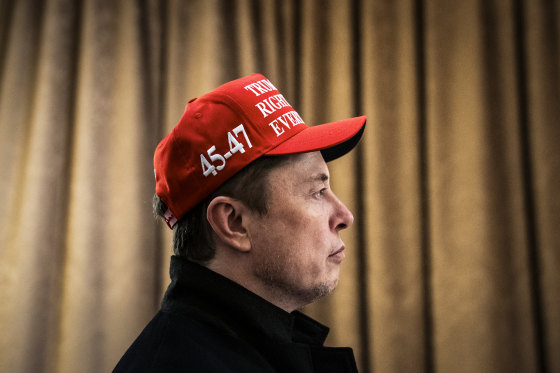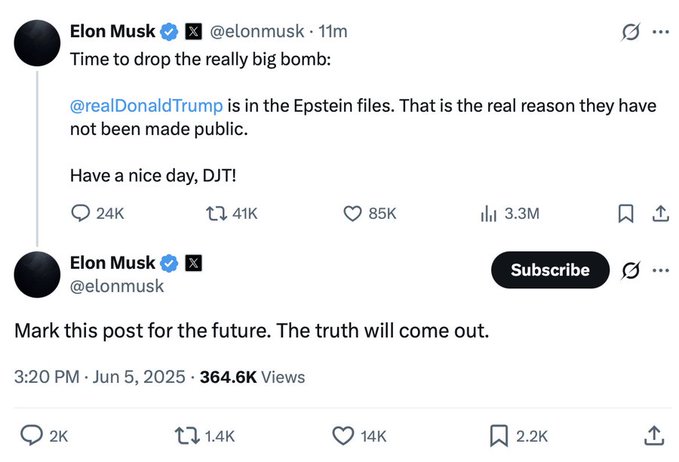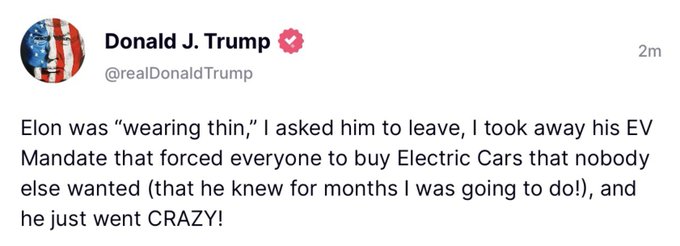The once chummy relationship between the president and the world’s richest businessman has deteriorated into a social media flame war.

President Donald Trump has escalated his sudden rupture with Elon Musk by implying the government could sever ties with the tech titan’s businesses.
“The easiest way to save money in our Budget, Billions and Billions of Dollars, is to terminate Elon’s Governmental Subsidies and Contracts. I was always surprised that Biden didn’t do it,” Trump wrote Thursday on Truth Social.
Various estimates have been put forward about just how much Musk’s firms, primarily SpaceX and Tesla, benefit from U.S. government contracts and subsidies. The Washington Post has put the figure at $38 billion, with SpaceX President and COO Gwynne Shotwell estimating that company alone benefits from $22 billion in federal spending. Reuters has reported that the true figure is classified because of the nature of many of the contracts Musk’s firms are under.
NASA relies on SpaceX to ferry astronauts to and from the International Space Station. The agency’s only other option at the moment is to pay around $90 million for a seat aboard Russia’s Soyuz capsule.
Last year, SpaceX was selected to develop a vehicle capable of safely de-orbiting the International Space Station in 2030, when NASA and its partner space agencies agreed to end operation of the orbiting laboratory. SpaceX is also expected to play a major role in NASA’s efforts to return astronauts to the moon and eventually travel beyond to Mars.
Later Thursday afternoon, Musk posted that he would begin “decommissioning” SpaceX’s Dragon spacecraft, which regularly flies astronauts and cargo to the ISS, in response to Trump’s threat.
NASA spokesperson Bethany Stevens said the agency “will continue to execute upon the President’s vision for the future of space.”
“We will continue to work with our industry partners to ensure the President’s objectives in space are met,” she said in a statement on X.
Tesla, meanwhile, has benefited from approximately $11.4 billion in total regulatory credits aimed at boosting electric-vehicle purchases, though that figure also includes state-level subsidies. Musk has claimed he no longer needs the credit, which he says now primarily benefits rivals.

Following Trump’s threat, shares in Tesla, which had already fallen 8% on Thursday as the tit-for-tat escalated on social media, declined as much as 15% following Trump’s post. SpaceX is privately held and its shares do not trade on the open market.
Trump’s warning came as part of a stunning exchange with Musk — who spent more than $250 million to help him get elected — that erupted into public view.
Earlier in the day, president told reporters in the Oval Office that he was disappointed in Musk’s criticism of the Republican policy bill that is making its way through Congress. Musk has blasted the bill, calling it a “disgusting abomination,” amid concerns it would worsen the U.S. fiscal deficit.
Musk, who officially left his White House role last week to spend more time on his companies, spent much of Thursday launching into a tirade on X, his social media platform, where he posted a variety of critiques of Trump, the bill and other Republican politicians.
A make-good on Trump’s threat would come at a sensitive time for Tesla, which has seen global sales plunge partly in response to Musk’s very involvement with the Trump campaign. Year to date, its shares are down some 25%.
Trump’s warning also raises the specter that Trump could resurface pending government investigations into Musk’s firms. According to a report in April from Democratic staff of the Senate Homeland Security Permanent Subcommittee on Investigations, Musk’s firms were facing $2.37 billion in potential federal liabilities when Trump took office in January.
Since then, many of those actions have been paused or outright dismissed alongside the rise of the previously Musk-helmed Department of Government Efficiency, which gutted many of the agencies looking into Musk’s businesses.


